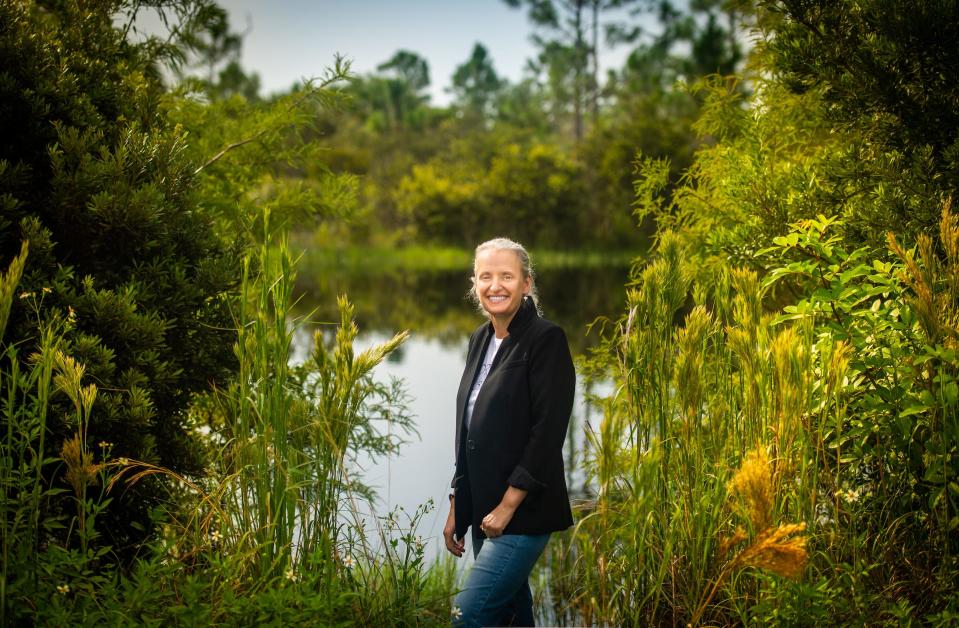Guest opinion: Let's invest more in climate change resilience for future prosperity
It's OK to admit you believe in climate change. Data demonstrates your neighbors agree! With this year’s hurricane season over, there is a clear indication we need to invest a lot more of our collective willpower and our public dollars in climate change resilience.
While Southwest Florida was spared a direct hit, this was the third most active hurricane season in history with 21 named storms. The National Oceanic and Atmospheric Administration (NOAA) says it's likely to be the most expensive hurricane season in history with $70 billion in damages. This is a harbinger of what's to come with climate change.
More: Guest opinion: Caring about people means caring about climate change
Although some readers challenged my past assertions that climate change is both real and a threat to Southwest Florida, belief in climate change is widely accepted and even a bipartisan issue here. The latest Florida Climate Resilience Survey conducted by Florida Atlantic University found a whopping 92% of Floridians believe climate change is happening, including a majority of Florida Republicans (88%) and Florida Democrats (96%). Nearly 3 in 4 respondents are concerned about the well-being of future generations in Florida due to climate change.
They are right to be worried. Only 27% of Floridians believe municipal, county and state governments are doing enough to address the impacts of climate change. Investing more money in climate change resilience is a legitimate use of public funds that will protect people, property and our way of life.

One area ripe for economic investment is flood adaptation and mitigation. In a recent piece I explained how low-income communities are especially at risk of severe flooding, which prompted a reader to question how such communities — that are likely inland — would be at risk from sea level rise and flooding compared to affluent beachfront and waterfront properties. Great question! Certainly, beachfront properties are at risk from storm surge and high tides. But Florida’s low-lying terrain and history of underfunded infrastructure in low-income communities creates heightened risk.
Low-income inland communities lack the engineered wetlands, stormwater systems and infrastructure maintenance more typical in affluent areas. In these areas, flooding can result from surface water runoff from heavy rains and saturated groundwater conditions, as well as a lack of green space and stormwater infrastructure. Inland flooding is historically the costliest severe weather event, and nearby waterway flooding during hurricanes is the deadliest aspect of storms. As sea level rises due to climate change, this becomes even more problematic.
Aside from the immediate threat to our health and welfare, flooding imperils our long-term economic stability. The U.S. Small Business Administration finds that more than 90 percent of small businesses fail within two years of being struck by a disaster, such as a hurricane or flooding. Small businesses (those with fewer than 500 employees) account for 56% of the jobs in Southwest Florida, according to the Regional Economic Research Institute at Florida Gulf Coast University.
This becomes more alarming in light of a new report by the First Street Foundation that found the vast majority of infrastructure in Southwest Florida is already at risk from flooding. Charlotte County was listed as the 10th most at-risk county for flood risk in the entire United States, with 87% of residential properties and 86% of commercial properties at risk of flooding under current conditions. Lee County is noted as having extreme risk of flooding over the next 30 years and has a higher flood risk than 98% of counties across the country. This extreme risk threatens our day-to-day life including access to utilities, healthcare, education and more. Visit the website of First Street Foundation where you can enter your home or business address to see your specific flood risk.
To be sure, any use of tax dollars or increased government involvement for climate change resilience will raise the hackles of some folks. Just because they are willing to risk their property, or stand by as others drown in their home while denying the need for action to combat climate change, does not mean they can take the rest of us with them. Most of us want our governments to do more to protect us — it's OK to say that publicly.
Make no mistake, climate change will hit your wallet one way or another. Beginning in October, the National Flood Insurance Program began hikes that are expected to raise the premiums of 80% of Floridians, including 91% of residents in Lee County. This is likely part of a trend where market goods and services will increasingly reflect the true costs associated with climate change, such as hefty price tags associated with public health emergencies, rising food costs and more. But that's a conversation for another day.
Dr. Jennifer Jones is director of the Center for Environment & Society, part of The Water School at FGCU.
This article originally appeared on Fort Myers News-Press: Let's invest more in climate change resilience for future prosperity

